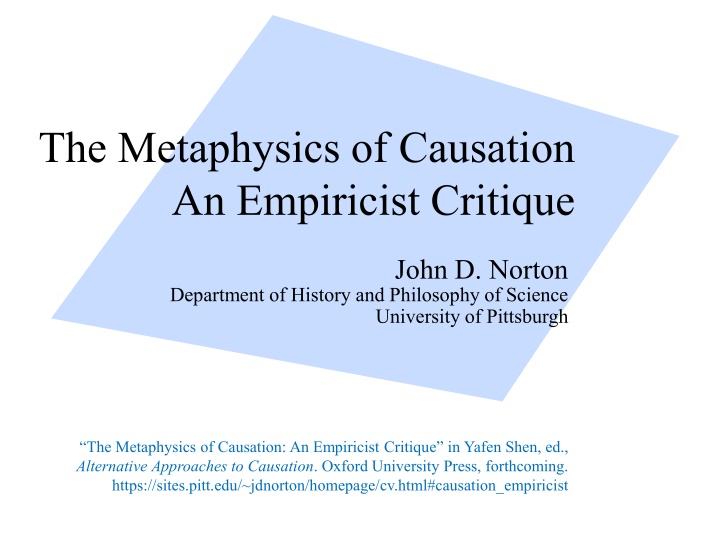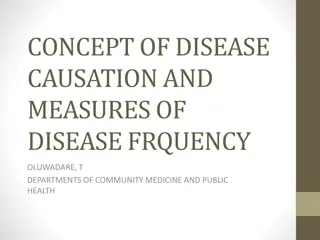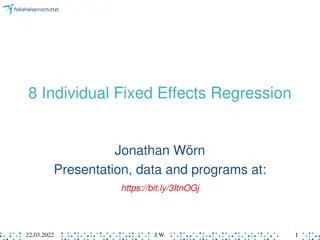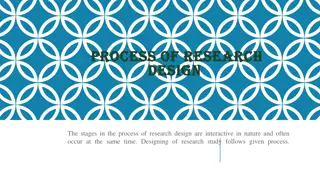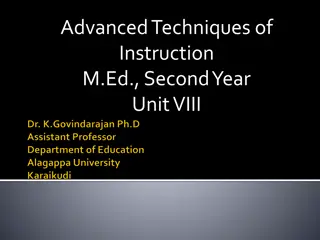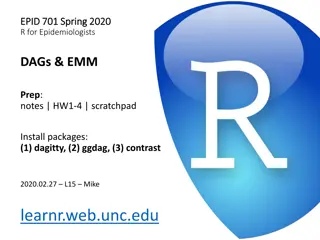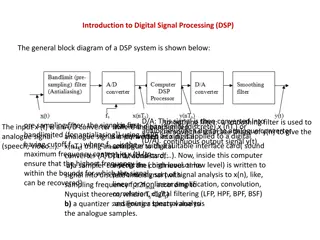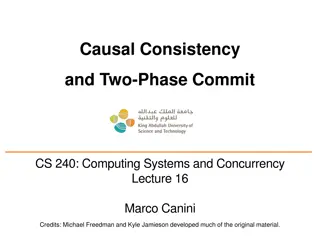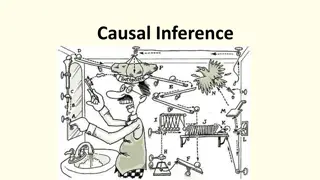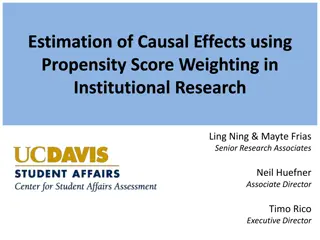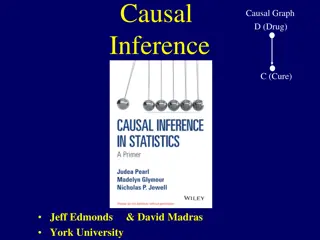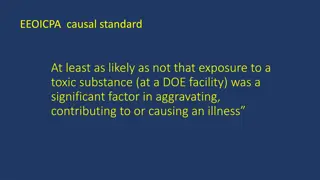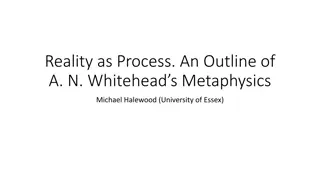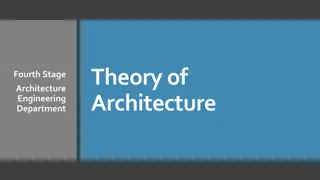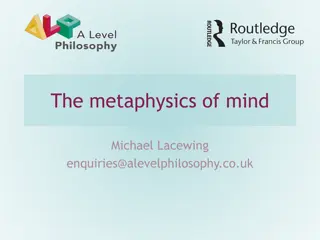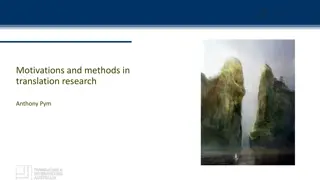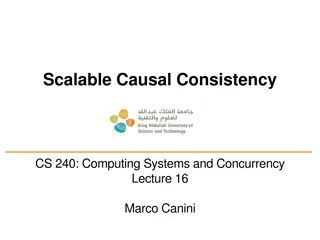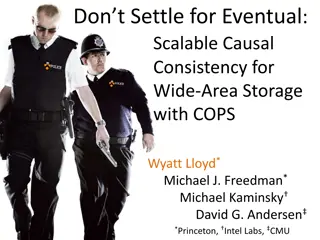Critique of Causal Metaphysics and Empiricism
In this content, the author critiques the metaphysics of causation from an empiricist perspective, exploring the limitations of empiricism in understanding the contingent truths of the world. It discusses causal antifundamentalism, various forms of skepticism, including Humean skepticism, and challenges to causal fundamentalism. The debate surrounding the nature of causation, the universality of causality, and the role of empirical evidence in shaping our understanding of cause and effect are central themes.
Download Presentation

Please find below an Image/Link to download the presentation.
The content on the website is provided AS IS for your information and personal use only. It may not be sold, licensed, or shared on other websites without obtaining consent from the author.If you encounter any issues during the download, it is possible that the publisher has removed the file from their server.
You are allowed to download the files provided on this website for personal or commercial use, subject to the condition that they are used lawfully. All files are the property of their respective owners.
The content on the website is provided AS IS for your information and personal use only. It may not be sold, licensed, or shared on other websites without obtaining consent from the author.
E N D
Presentation Transcript
The Metaphysics of Causation An Empiricist Critique John D. Norton Department of History and Philosophy of Science University of Pittsburgh The Metaphysics of Causation: An Empiricist Critique in Yafen Shen, ed., Alternative Approaches to Causation. Oxford University Press, forthcoming. https://sites.pitt.edu/~jdnorton/homepage/cv.html#causation_empiricist
ImageFX response to prompt: The Metaphysics of Causation: An Empiricist Critique https://aitestkitchen.withgoogle.com/tools/image-fx 2
Empiricism? e Small-e empiricism We can only learn contingent truths of the world from experiences of the world. We can learn that there truly are quarks. E The only contingent truths of the world we can learn are experiences of the world. Big-E empiricism We cannot know that there truly are quarks. 3
Causal Antifundamentalism The form of causal skepticism defended here 4
Causal Fundamentalism: the doctrine Nature is governed by cause and effect; and the burden of individual sciences is to find the particular expressions of the general notion in the realm of their specialized subject matter. There is a universally applicable principle of causality. Unity of meaning of causal talk in different domains. Causation factually restricts how things can connect in the world. 5
Causal Fundamentalism: the doctrine Nature is governed by cause and effect; and the burden of individual sciences is to find the particular expressions of the general notion in the realm of their specialized subject matter. There is a universally applicable principle of causality. DENIED 6
NOT Humean Skepticism Thus not only our reason fails us in the discovery of the ultimate connexion of causes and effects, but even after experience has inform d us of their constant conjunction, tis impossible for us to satisfy ourselves by our reason, why we shou'd extend that experience beyond those particular instances, which have fallen under our observation. We suppose, but are never able to prove, that there must be a resemblance betwixt those objects, of which we have had experience and those which lie beyond the reach of our discovery. David Hume Inductive Skeptic Treatise of Human Nature, Book 1, Part III, Section VI pp. 91-92. 7
NOT Humean Skepticism Things connect together in all sorts of interesting and complicated ways. Inductive optimist We can learn inductively of new, unexperienced cases from old experienced cases. +0 +0 Causal metaphysics has nothing factual to add. 8
NOT Causal Eliminativism Russell: oddly enough, in advanced sciences such as gravitational astronomy, the word cause never occurs A potential difference between the clouds and the earth caused a lightning strike. A potential difference between the clouds and the earth ionized the air and led to an electrical discharge. Mere play with synonyms. Consequence of antifundamentalism not its substance. 9
A Dilemma for Causal Fundamentalism 10
The Dilemma Conforming a science to cause and effect EITHER (first horn) We must find some restriction that can be properly applied to all sciences. No appropriate restriction; no enduring principle of causality. places a restriction on the factual content of a science OR(second horn) The imposition of the causal framework makes no difference to the factual content of the sciences. it does not place a restriction on the factual content of a science. It is an exercise in labeling. 11
First horn History of failure to provide facts of causation independently. Causal metaphysics repeatedly corrected by newer science. 4th c. BC. Aristotle s four causes. Material, formal, efficient, final. 17th c. mechanical philosophy. No place for final causes. 17th c. Newton. Action at a distance? so great an absurdity that no man, who has in philosophical matters a competent faculty of thinking, can ever fall into it. 18th, 19th c. No mechanism found; no finite velocity measured; no shielding. Gravity is action at a distance. 19th century dogma of determinism. No agents/patients, continued existence of cause. Causation is determinism. Causes guarantee effect. 20th c. Quantum theory. Physics supplies probabilities only of effects. The Law of Causation is but the familiar truth, that invariability of succession is found by observation to obtain between every fact in nature and some other fact which has preceded it; independently of all considerations respecting the ultimate mode of production of phenomena, and of every other question regarding the nature of Things in themselves. J. S. Mill, System of Logic (Book III, Chapter V, 2. p. 236.) 12
First horn History of failure to provide facts of causation independently. Causal metaphysics repeatedly corrected by newer science. Measure problem of inflationary cosmology 20th c. Dogma of probabilism Classical spacetimes in GR without Cauchy surfaces I shall argue in this chapter and the next that causation s connotations require every cause to raise the chances of its effects. (p. 67) Quantum systems with non- separable Hamiltonians The first point I must make about chances is that they are probabilities. My other claims about chance may be contentious, but not this one: everyone measures chances by numbers which satisfy the standard calculus of probabilities. (p. 21) Hugh Mellor, The Facts of Causation. (1995) Infinitely many masses colliding classically Toy classical systems (domes) 13
Second horn Causation places no factual restriction on science. Causal notions cannot contradict any science. Any science can admit causal description if we choose suitable meanings for our causal terms. Facilitate understanding of a science; may even be necessary for understanding. Value of causal concepts is pragmatic. Heuristic value: seeking causes has proven fertile. More 14
Second horn Causation places no factual restriction on science. A Intervention on A associated with a change in B. Woodward s interventionist account of causation. = causes B Only a definition. No factual assertion that such relations exist in the world. Pragmatic value: Manipulable associations are of special value to us. Important to point out which they are. 15
Familiar causal talk Electrons jump among their energy levels in a hydrogen atom in the presence of an electromagnetic field according to the transition amplitudes of quantum electrodynamics. Incident radiation causes an electron to jump to a higher energy level. vs It then jumps down, seeking its lowest energy state, which is the final cause. Pragmatic value in helping us understand. Causal notions add nothing factual. No independent causal principle. No independent ontology of causes. Superimposed narrative is a folk science. 16
Curies Principle 17
Curies Principle A a symmetry of its effect. manifests as symmetry of a cause When certain causes produce certain effects, the symmetry elements of the causes must be found in the their effects. Pierre Curie, 1896 18
Curies Principle A a symmetry of its effect. manifests as symmetry of a cause Present state: Spherically symmetric source of radiation. Future state: Emitted spherically symmetric waves. 19
Curies principle is A deep truth of causal metaphysics Leibniz s principle of sufficient reason applied to causation. Achieved by necessary vagueness. (H. Freudenthal) Cheap generality For deterministic and indeterministic systems. (Ismael) Demonstrable truth Always protected by seeking hidden asymmetries. (Chalmers) Irrefutable Counterexamples: Indeterministic systems (van Frasssen) Spontaneous symmetry breaking (??) Falsehood Time reversal. (Roberts) 20
a Truism 21
Curies principle says a cause carries a symmetry the effect carries that symmetry. IF THEN Abundant counterexamples: Cause. Spherically symmetric atom. Effect. Spatially asymmetric emission event. 22
Curies principle says the dependence of effect on cause respects the symmetry, a cause carries a symmetry the effect carries that symmetry. AND IF THEN then it is protected from the counterexamples, but 1 Curie s principle is now a tautology. It is true no matter what cause, effect and symmetry mean. 2 Its instantiation in any system is arbitrary. It depends on how we choose to stipulate that the terms cause and effect map into the system. Truism = result easily gained by stipulation. 23
Example 24
Alpha Decay (Curie principle does not apply.) Cause. Spherically symmetric atom. Effect. Spatially asymmetric emission event. 25
Alpha Decay (Curie principle applies) Cause. Spherically symmetric atom. Effect. Spatially symmetric probability distribution over emission events. 26
Which is the right effect? Probability distribution over decay events? Individual decay events? Type causation Token causation whichever you like. 27
Second horn Causation places no factual restriction on science. Any science can admit causal description if we choose suitable meanings for our causal Causal notions cannot contradict any science. terms. Any science can admit causal description if we choose suitable meanings for our causal terms. Facilitate understanding of a science; may even be necessary for understanding. Value of causal concepts is pragmatic. Heuristic value: seeking causes has proven fertile. More 28
The debate over Downward Causation 29
Downward causation The mental Upper level Thermodynamics causally acts on Lower level Statistical physics The physical 30
Is downward causation possible? NO! It violates trusted causal maxims! YES! Why not . 31 31 31 31
Causal maxims Exclusion. No single event can have more than one sufficient cause occurring at any given time unless it is a genuine case of causal overdetermination. (Kim, 2005, p. 42) Closure. If a physical event has a cause that occurs at t, it has a physical cause that occurs at t. (Kim, 2005, p. 43) Wholes to parts. Wholes cannot act causally on their parts. (Craver and Bechtel, 2007) Asymmetry. The causal relation is asymmetric: causes act on their effects, but effects do not act on their causes. (Craver and Bechtel, 2007) Time delay. The causal relation is time ordered: causes precede their effects. (Craver and Bechtel, 2007) 32
?????? Justifications Most common: Tacit Precise meaning of cause vague. Maxims are declared. Argumentum ad populum Causes explain. Recovered causal maxims from explanatory maxims. (Kim) Interrelations among maxims the possibility of bottom-up and top-down influence propagated simultaneously across levels results in problematic causal circles. (Bechtel and Craver) 33
Fragility of Maxims Exclusion. No single event can have more than one sufficient cause occurring at any given time unless it is a genuine case of causal overdetermination. Succeeds for Salmon-Dowe conserved quantity theory of causation. Closure. If a physical event has a cause that occurs at t, it has a physical cause that occurs at t. Fails for Woodward interventionist account. Causal relations identified depend on variables examined. Intervene on upper-level temperature to manipulate lower-level water molecule speeds. 34
Fragility of Maxims Laplace: We ought then to regard the present state of the universe as the effect of its anterior state and as the cause of the one which is to follow. Today s total arrangement of the planetary system causes tomorrow s eclipse. Wholes to parts. Wholes cannot act causally on their parts. Asymmetry. The causal relation is asymmetric: causes act on their effects, but effects do not act on their causes. Incompatible with: Time reversible physics. Dynamic equilibrium in chemistry A + B C+ D Incompatible with: Instantaneous gravitational action at distance Theories of backward causation. Time delay. The causal relation is time ordered: causes precede their effects. 35
Conclusion 36
I have claimed Causal metaphysics does not provide a repository of causal knowledge independent of empirical science. Causation is about the physical connectedness of things in the world. Its discovery is the province of empirical science. It adds factually to science. Attempt at a priori science. Repeated failure. Dilemma for causal metaphysics. It does not add factually to science. Exercise in labeling. May be pragmatically useful. Efforts to discover a factual principle of causality have failed. 37
Free Metaphysicians are freed from the shackles of endlessly failed attempts to find a true, factual principle of causation. ImageFX prompt many chains breaking photorealistic https://aitestkitchen.withgoogle.com/tools/image-fx Empiricists are freed from the shackles of Hume s excessive inductive skepticism about induction and causation. We are free to use the term causation any way we d*mn well please. 39
The End 40
Appendices 41
An Independent Principle of Causality in Electromagnetic Scattering? 42
Scattering from a dielectric excites dielectric atom and generates scattered field Incident plane wave approaches from left and passes. Total field (incident plus scattered) Scattered field (total minus incident) 43 Frames from animation at http://www.met.rdg.ac.uk/~swrhgnrj/maxwell/circle3.html
Classical electrodynamics is time reversible. Reversed Forward Ordinary scattering processes are possible. Time reversed scattering processes are possible. How do we recover the ordinary outward scattering of our common experience? 44
P. 322 Set G( ) = 0 for < 0. only values of the electric field prior to that time enter ... in accord with our fundamental ideas of causality in physical phenomena. 45
Mathias Frisch: This is a principle of causality The most Sacred Tenet ? Causal Reasoning in Physics 2009 we postulate as an additional constraint on all causally possible models thatan effect cannot temporally precede its causes. Universality not assumed Causal assumptions just as other scientific assumptions can play a substantive and legitimate role in a certain domain and their use can be physically well-founded in that domain even if we do not take the assumptions to have universal scope and even if we in fact believe that the assumptions fail outside of their domain of application. 46
Time Reversed Scattering is Possible but rare and very hard to set up. Our choice restricts the analysis to ordinary scattering, through selection of boundary and initial conditions. Reversed scattering does happen. 47
An effect cannot temporally precede its cause. What precisely does this principle say? Must be precise enough to be applied in a computation in mathematical physics. Which state is the effect and which the cause, in any process with states that evolve over time? The cause comes earlier? That makes the principle true by definition. What counts as a cause? An effect? States over time? At an instant? Which hypersurface of simultaneity? What sorts of processes are properly causal? Causal means later states depend on earlier? What of Lagrange principles that pick out motions by extremizing the entire history? 48
Basic Physics of Scattering incident fields at same position x and other times Scattered field at position x is a linear sum of scattered(x,t)= incident(x,t -t')dt' G(x,t) - ( LIN ) Hence incident can only contribute to scattered for t-t >=0 i.e. t <t. No influence from future ( NIFF ). G(x,s)=0 for all s<0. How do we arrive at this relation? 49
Curies Principle A a symmetry of its effect. Curie s version. manifests as symmetry of a cause crystal lattice and external fields Properties: mechanical, electric, magnetic, thermal; piezoelectric, piezomagnetic, pyroelectric, pyromagnetic, piezo-caloric, magneto- caloric, magneto-electric polarization 50
